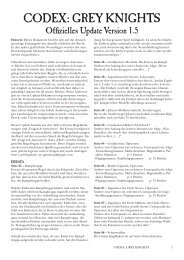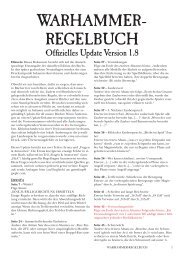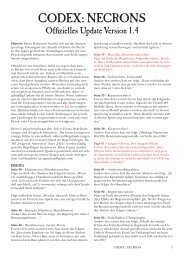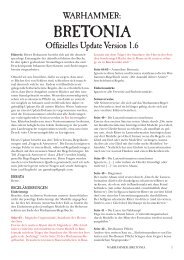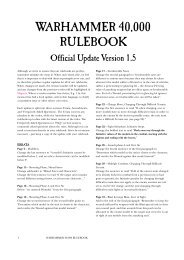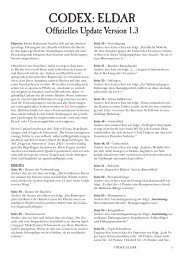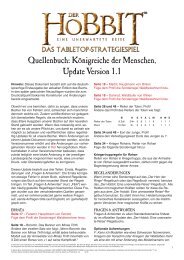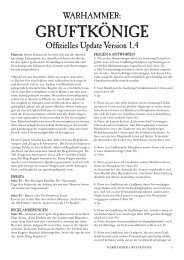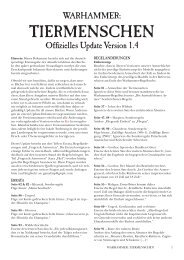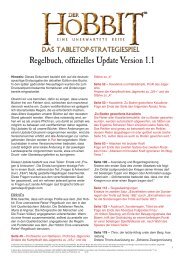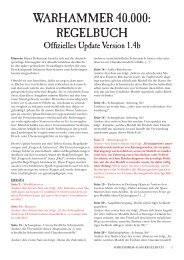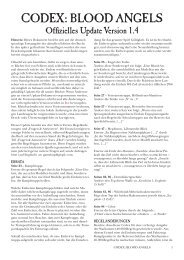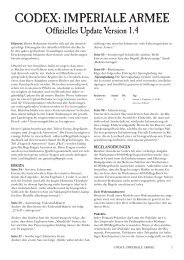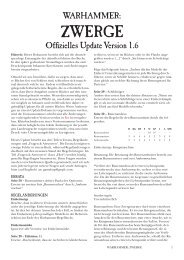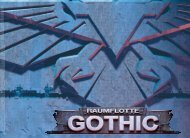Necromunda rulebook - Games Workshop
Necromunda rulebook - Games Workshop
Necromunda rulebook - Games Workshop
Create successful ePaper yourself
Turn your PDF publications into a flip-book with our unique Google optimized e-Paper software.
NECROMUNDA<br />
necromunda campaigns<br />
Although it is perfectly acceptable to fight one-off games, part of the challenge of <strong>Necromunda</strong> is to campaign<br />
a gang over a period of time and many fights. This gives you the opportunity to watch your gang develop, to<br />
see old fighters gain new skills while new fighters join and the gang grows ever more famous. This section<br />
explains how the Campaign rules allow a gang to progress from modest and obscure origins to power, glory<br />
and inestimable wealth.<br />
STARTING THE CAMPAIGN<br />
To start a campaign you’ll need at least two players<br />
and preferably three or more. The more players the<br />
better! Each player can have more than one gang, but<br />
our experience is that players prefer to run one at a<br />
time as this allows each gang to fight the most games<br />
in as short a time as possible.<br />
Gangs come from the area around one of the<br />
Underhive settlements. They hang around the trading<br />
posts and drinking holes, waiting for news of local<br />
finds or offers of work. When not fighting the gangs<br />
are repairing their gear and trading with the locals.<br />
This gives each gang a certain amount of income,<br />
which they can spend on recruitment and new<br />
weapons, or save as credit with the local Guilders.<br />
You can start the campaign as soon as two players<br />
have recruited their gangs. New players can join the<br />
campaign at any time thereafter. Although new gangs<br />
will be less developed they will soon learn new skills.<br />
Fighting other, more powerful gangs will enable<br />
them to develop more quickly.<br />
82<br />
PLAYING THE CAMPAIGN<br />
To start the campaign two players simply take their<br />
gangs and select one of the scenarios to fight (see<br />
page 109). At the end of each game the players work<br />
out how much ‘experience’ the gang fighters have<br />
earned and how much ‘cash’ the gang collects by<br />
trading.<br />
Experience is expressed as Experience points which<br />
individual fighters receive for surviving each game<br />
and doing particularly well in the fighting. This is<br />
covered in detail later in the Experience section.<br />
When a fighter has sufficient Experience points he<br />
receives an ‘advance’. An advance might improve his<br />
characteristic profile, adding to his WS, BS, S etc, or<br />
it might be a special skill such as ‘Marksman’ or<br />
‘Rapid Fire’.<br />
Cash is collected after each game in the form of extra<br />
Guilder credits which are added to the gang’s total<br />
cash reserve or stash. This represents the profits<br />
earned by the gang after taking into account living<br />
expenses and the cost of replacing ammunition and<br />
damaged weapons. You can spend the stash on<br />
recruiting more fighters or buying new weapons as<br />
explained in the Trading Post section.



